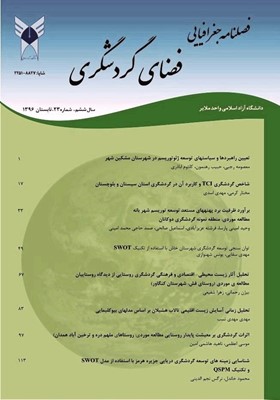تحلیل آثار زیست محیطی– اقتصادی و فرهنگی گردشگری روستایی از دیدگاه روستاییان مطالعهی موردی (روستای فش، شهرستان کنگاور)
محورهای موضوعی : مربوط به گردشگری
کلید واژه: گردشگری روستایی, آثار گردشگری, جامعهی میزبان,
چکیده مقاله :
امروزه گردشگری از جنبههای مختلف اثرات شگرفی را بر حیات روستا برجا میگذارد. آگاهی از دیدگاه جامعهی میزبان به عنوان عرضه کننده محصول گردشگری اهمیت فراوان دارد. پژوهش حاضر از نوع پیمایشی و به روش توصیفی و تحلیلی به بررسی دیدگاه روستاییان نسبت به اثرات گردشگری روستای فش شهرستان کنگاور پرداخته است. جامعه آماری روستاییان و حجم نمونه با استفاده از فرمول کوکران 226نفر به روش تصادفی سیستماتیک انتخاب شدهاند. برای جمعآوری دادهها از پرسشنامه و طیف لیکرت و برای تجزیه و تحلیل دادهها از نرم افزار spss 18 استفاده شد. یافتههای پژوهش نشان میدهد اثرات گردشگری مثبت و منفی معناداری دراین منطقه وجود دارد. بهطوری که در زمینهی اقتصادی باعث ایجاد مشاغل جدید، افزایش درآمد، تمایل به مشاغل خدماتی، افزایش هزینههای زندگی و شکاف درآمدی و در حوزه اجتماعی- فرهنگی باعث افزایش ارتباطات و آگاهی عمومی، کاهش امنیت برای زنان و دختران، افزایش جرم و همچنین در زمینه زیست محیطی باعث تخریب محیط زیست و همچنین بالا رفتن انتظارات و آگاهی روستائیان در ارتباط با حفاظت از محیط زیست و .... شده است. بنابراین برنامهریزی نظامند و مشارکت روستاییان فش در بخش گردشگری میتواند موجب تغییر و تحول در ابعاد اقتصادی و اجتماعی- فرهنگی در زندگی مردم روستا شود و از اثرات منفی زیست محیطی گردشگری بکاهد.
Today; tourism affects rural life from different social, cultural, economic, and environmental aspects. Awareness is important as far as the host society as a supplier of tourism products is concerned. The present study used a survey and descriptive-analytical approach to analyze the villagers’ viewpoints about the effects of rural tourism in Fash. The 226 statistical population of the study was the villagers who were selected using a systematic random sampling. Likert scale and questionnaire were used for data collection and the SPSS 18 software was applied for data analysis. The findings showed that there were both positive and negative statistically significant effects in the area understudy. Concerning the economical aspects, new job creation, increasing income, tendency for service oriented careers were the positive aspects; while cost increase, people’s income gaps, increasing society’s awareness, decreasing security for girls and women in the society, increasing crimes, environment pollution and destruction, and at last increasing the expectations of villagers were the significant negative aspects of economy. Therefore the villagers’ systematic planning and their active participation in tourism sector could change the economic, cultural, and social aspects of rural life and thus could decrease the existing negative environmental effects of tourism
_||_

